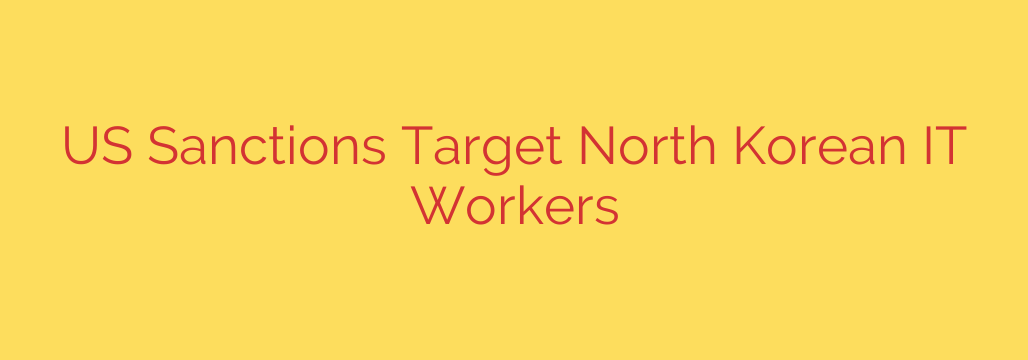
US Sanctions Target Hidden North Korean IT Workers Fueling Weapons Programs
In a significant move to disrupt illicit revenue streams, the United States has imposed new sanctions on a network of individuals and companies linked to North Korea’s global IT operations. These actions highlight a growing and often invisible threat: highly skilled North Korean tech workers who use fraudulent identities to secure remote employment at companies worldwide, with their earnings funneled directly back to the regime’s illegal weapons programs.
This sophisticated scheme poses a serious risk not only to international security but also to businesses that may unknowingly hire these individuals, thereby becoming unwitting accomplices in funding the development of weapons of mass destruction (WMD) and ballistic missiles.
The Deceptive Global Operation
The U.S. Department of the Treasury’s Office of Foreign Assets Control (OFAC) has targeted key players in this network. Among those sanctioned is the Pyongyang-based Chinyong Information Technology Cooperation Company, which is accused of dispatching thousands of skilled IT workers to foreign countries. These operatives are embedded in nations like Russia and Laos, where they work to generate income for the North Korean government.
To circumvent international sanctions and scrutiny, these workers employ a range of deceptive tactics. They often use fake names, forged nationality documents, and proxy accounts to build seemingly legitimate freelance profiles. This allows them to apply for jobs on popular tech platforms and directly with companies in North America, Europe, and East Asia, often commanding high salaries due to their technical expertise in fields like software and mobile app development.
The core of the threat lies in the fact that this is not simply individual freelance work; it is a state-sponsored operation. The substantial revenue generated—estimated to be millions of dollars annually—is a critical financial lifeline for the DPRK, directly supporting its weapons proliferation activities in violation of United Nations Security Council resolutions.
Key Individuals and Facilitators Sanctioned
The recent sanctions target specific individuals for their direct roles in managing and facilitating these operations. This includes:
- Kim Sang-su: A representative of the Chinyong company based in Russia.
- Jong Hyok: An individual based in China who has assisted North Korean IT workers with obtaining fraudulent identities and securing overseas employment.
- Vladislav Kaa: A Russian national who has provided support and accommodation to North Korean IT workers operating out of Russia.
By targeting these facilitators, the U.S. aims to dismantle the support structures that allow these illicit operations to thrive.
How Businesses Can Protect Themselves: Red Flags and Actionable Steps
The infiltration of these state-sponsored operatives into the global workforce presents a significant compliance and security challenge. Companies that rely on remote or freelance tech talent must heighten their due diligence to avoid inadvertently funding a hostile regime.
Vigilance during the hiring process is the first line of defense. Here are critical red flags to watch for when vetting remote IT candidates:
- Inconsistencies in Identity: Scrutinize resumes, social media profiles, and portfolio websites for conflicting information regarding names, education, or work history.
- Refusal of Video Communication: Be wary of candidates who consistently refuse to participate in live video calls, as this is a common tactic to hide their true identity and location.
- Requests for Payment in Virtual Currency: While legitimate freelancers may use cryptocurrency, a strong preference or demand for payment in virtual assets can be a sign of an attempt to bypass traditional financial systems and sanctions.
- Use of Third-Party Accounts: Candidates who ask for payments to be sent to an account under a different name or who are using a freelance platform profile registered to someone else should be considered high-risk.
- Suspicious IP and Login Data: Monitor for logins from multiple, geographically distant IP addresses, which may indicate that a single account is being shared by a team located in a high-risk jurisdiction.
To strengthen security, businesses should implement robust “Know Your Customer” (KYC) and identity verification protocols for all remote contractors, not just full-time employees. This includes verifying documents, conducting background checks, and maintaining clear communication channels to ensure you know exactly who is accessing your company’s network and projects. Protecting your business from this threat is not just a matter of compliance—it’s a crucial step in promoting global security.
Source: https://www.bleepingcomputer.com/news/legal/us-targets-north-korean-it-worker-army-with-new-sanctions/








